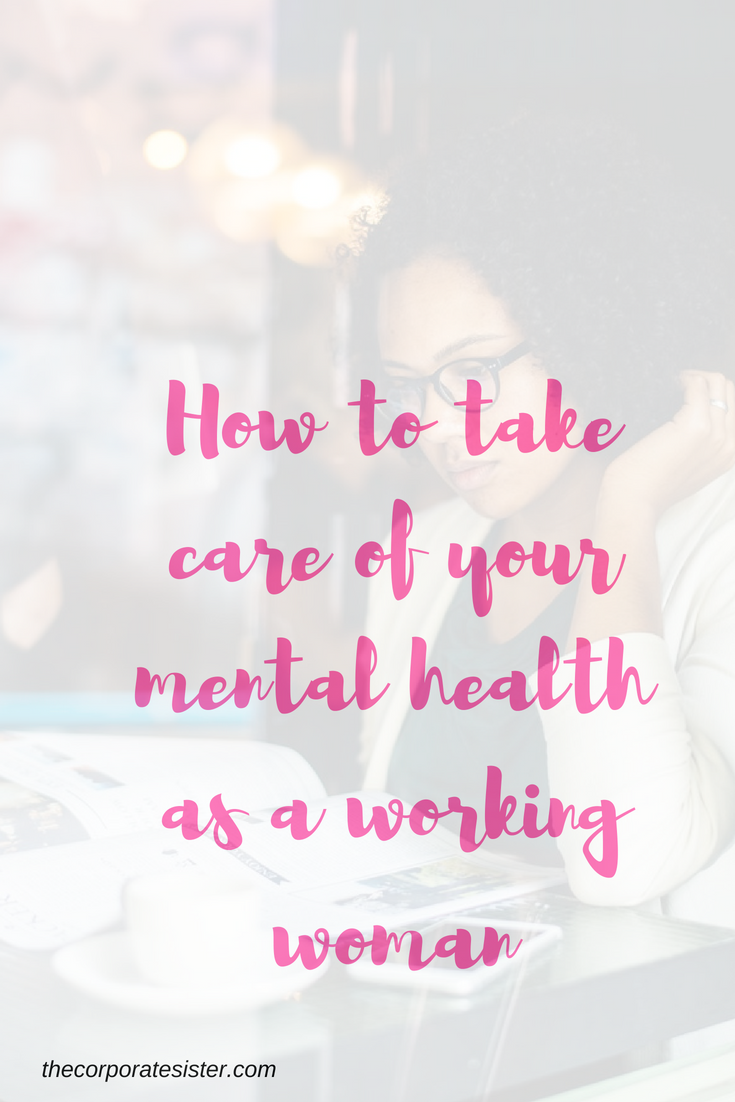
May is Mental Health Awareness Month, and it’s got me thinking about how we, as working women, face mental health challenges at work and in life. As I did some research, I found out that according to the National Institute of Mental Health, there were over 44.7 million adults over the age of 18 suffering from a mental illness in the United States. Of these, 21.7% affected were women, as opposed to 14.5% being men.
Yet, women, especially working women, are among the least likely to admit their mental health struggles. So many of us are socialized to appear a certain way and play a given part, whether at work or in life. We’re expected to be the nice, caring, supportive ones, who take one (or many) for the team. Yet, we’re also supposed to be resilient, strong, and virtually unbreakable in the face of the many demands and pressures placed on us, whether professionally or personally. In other words, we’re expected to have it all together, and keep it that way. From the working mother who plans the perfect birthday party while managing to finish the audit report, to the mompreneur up until 2am while the kids are asleep, not to mention the stay-at-home mom juggling meals, laundry and soccer games, while still looking human.
In the midst of our unending to-do lists, un-folded laundry and big projects, it can be easy to forget our mental health. Truth is, it’s more convenient to do so. After all, who wants to admit that they don’t have it all together? How many can honestly admit to grappling with bouts of depression or anxiety? Not many. Society, especially this social media obsessed, appearances-minding, keep-up-with-the-Joneses, all-is-well-in-the-best-of-worlds, society, doesn’t exactly cast a kind eye on people, and women in particular, who are not strong enough.
In my native Senegalese culture, the Wolof term “sutura” alludes to this need to keep face, even when submerged with issues, out of human dignity and honor. While this was an honorable concept back in the days, It has slowly turned into a “saving face” contest. Many resort to putting themselves in debt, or pretending to be well off and happy, more out of a sense of personal pride than dignity. In the same way, some spend thousands of dollars to “stunt on the ‘gram”, and impress others with what they don’t really have. As a result of all this, taking care of one’s mental health, especially as a working woman, has become a tremendous challenge.

As a working mom of 2 and a budding entrepreneur, I have experienced, like so many other working moms, times when I was mentally at my worst. Those were times plagued with fatigue, insecurities, and high personal and professional stress. Yet, it took me a long time to give myself permission to acknowledge the importance, and at times fragility of my mental health. It has taken me even longer to commit to proactively protecting it. There are so many taboos and silences around mental health issues, from depression to anxiety and suicide. This is especially prevalent at work where many working women have to put on a professional mask, which perpetuates this culture of mental health avoidance.
What can you do as a busy working woman to take care of your health in a proactive, dignified and most importantly effective manner? It’s a question I’ve asked myself many times. Along my personal and professional journey, I’ve been fortunate to find and receive some guidance in this area that I’d like to share.I’ve also been comforted by the fact that we’re never alone in our own journey when it comes to caring for our mental health. We’re walking alongside so many other women who are trying their best, and also striving to protect their own mental health.
Here are some tips on taking care of your mental health as a working woman:
-
Acknowledge your mental health struggles
It begins with being honest with yourself, and more particularly the struggles you’re encountering with regards to your own mental health. If you’re not feeling like yourself, are unusually tired and sad, or continuously feel a sense of impending doom, chances are your mental health is seriously suffering. Consider discussing this with your doctor, and getting a recommendation for a psychologist. Do not just dismiss your symptoms, self-medicate or wait for it to pass.
If you ask me, I think every single person should see a psychologist at least once. As a matter of fact, everyone should periodically check in with a psychologist. The reason for it is that we all go through complex experiences and face dire challenges and obstacles in our work and life. We all process them differently, not realizing the heavy impact they may have on us. Being able to speak to someone who is detached and qualified enough to help you come to terms with your own experience is key.
To Do: Don’t be afraid to acknowledge your mental health struggles, if only to yourself at first. You can’t solve an issue you won’t recognize. Understanding that your mental health is one of your most important assets goes a long way in being purposeful, successful and happy at work and in life.
-
Stop the elephant in the room syndrome: Talk about it
Mental health is the proverbial elephant in the room for many working women. As an introvert and a pretty private person, simply admitting that I was stressed was a challenge. Never mind sharing some of my difficult moments with others…
As working women, especially as women of color, talking about our mental health struggles feels counter-intuitive. For many of us, the way we were raised and our cultural environments also preclude us for discussing the elephant in the room. Instead, we tip toe around it, pushing ourselves to be strong even when we need to heal and take care of ourselves.
To Do: Find trusted friends or colleagues to confide in, and release the tension that may be accumulating inside of you. Consider consulting with a mental health professional as well to learn ways to cope with your particular sources of stress.
-
Set some boundaries!
Have you found yourself over-committed, burdened and as a result, depressed and anxious? Or do you take on so much (and so many people) that you end up losing your own sanity? Even better, do you allow life, work and its circumstances to overwhelm you to the point of sacrificing your own mental well-being? I know I have…We may all have at some point of another. After all, it comes with the territory, as a woman, wife, mom, sister, etc…
I was having a conversation earlier with a sister friend of mine, and both of us were discussing how challenging it is for us as working women to say no. Whether it’s declining yet another invitation to help on a project because we already have so much on our plates, or saying no to a commitment we cannot afford to take on, or even refusing to be treated a certain way, setting clear boundaries is key to our good mental health.
To Do: Learn to say NO! Don’t feel guilty for declining a commitment, staying away from someone, or simply taking the time to care for yourself. Without the proper controls on your work and life, you’re putting your mental health at risk.
-
Take some time out
Sometimes, you’ve just got to bow out and take some time out for yourself. As a matter of fact, you should do it regularly to avoid burnout and mental exhaustion. As working women, we tend to run ourselves ragged in search of the perfect work-balance, which by the way doesn’t exist. We feel guilty for not being more accomplished at work. We feel guilty for not being the perfect wives, mothers, friends and sisters we believe we should be. By the time we’re done completing all our projects, fixing the perfect dinner, answering all our text messages and returning calls, we’re on the verge of losing our edges. I know I am…
I’ve now made it a tradition to take some serious time out, including from social media, constant work and even my own kids and family. The hubby and I manage our schedules so that each of us can spend some time alone on weekends or on some week nights. It’s not just about balance, it’s about sanity!
To do: Schedule some time out for yourself and pencil it in your calendar just as you would any other important commitment. Steer away from work, family and social media, and use this time to refresh and do something you really enjoy. It may be a mani-pedi, reading a book or just staring at the ceiling, your choice!
-
Help eliminate the stigma around mental health
As working women, we unconsciously tend to repeat the mental health stigma around us by not showing ourselves the grace needed to care for ourselves. It’s by allowing yourself to be honest enough to recognize mental health is important, and that we all may suffer from issues around it, that you allow other working women to do the same. By the way you care for yourself, set boundaries around your life, you also inspire other working women to do the same.
Most importantly, by being willing to talk about it, you also contribute to destigmatizing the issue of mental health among working women. It takes being vulnerable to show the power that exists in healing so we can be the best version of ourselves.
To Do: Stop and pay more attention to the other women around you. Be willing to be vulnerable and share some of your struggles, not as a sign of weakness but as a sign that we all go through similar struggles and need to support each other in the process. Last but not least, refrain from judging another working woman who’s struggling at the moment, as you may have already been in her shoes.
All in all, taking care of your mental health as a working woman is a priority you should devote your time, attention and energy to. Being honest and forthcoming about the issues you’re facing, sharing them with the right people, setting boundaries and taking some time out can help. By taking care of your mental well-being, you can also help empower other women and reduce the terrible stigma around mental health.
Now your turn: How do you take care of your mental health?
To Your Success,
Solange.







